Reviews 2013-14
2nd Oct 2013
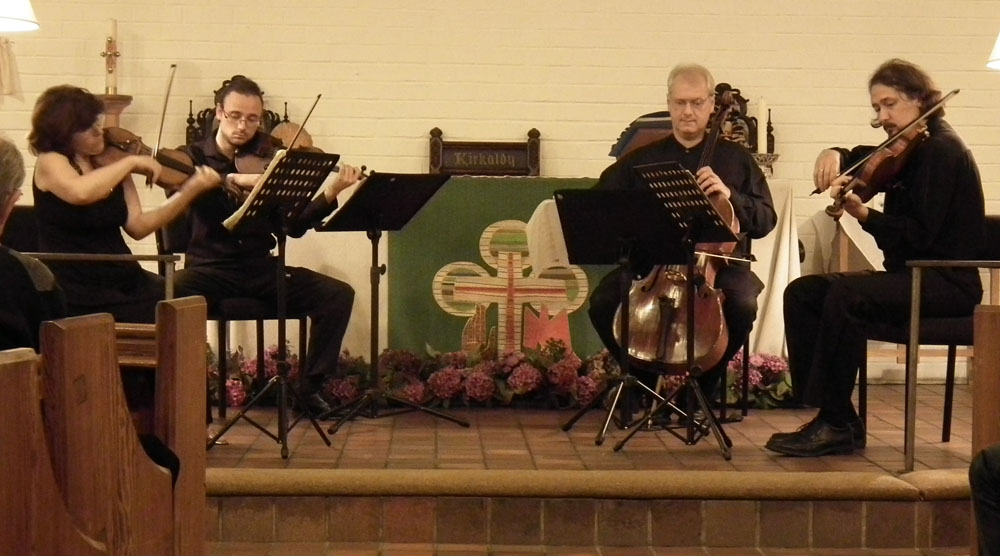
St Petersburg String Quartet
The 2013/14 season started on October 2nd with a concert by the St Petersburg String Quartet. The Quartet was formed in 1985 and is now based in the USA.
With a surprisingly small audience at St Peter's to hear this top class Quartet, they played a programme of Russian music. They started with Shostakovich's Quartet No 1, the first of his 15. Although the Quartet is brief and approachable, the St Petersburg performed it with great intensity and concentration. This was followed by Borodin's Quartet No 2, which had some of its themes plundered for the Musical, Kismet. The second movement has a theme used in "Baubles, Bangles and Beads" and a theme from the third movement is used in "And This Is My Beloved". Of course Borodin transcends what can be done by lifting a tune and putting it in a Musical, by developing the themes, passing them round the instruments and making wonderful key changes.
After the interval the Quartet played Tchaikovsky's Quartet No 1, with its famous second movement Andante Cantabile. The Quartet had demonstrated its mastery of the Russian Quartet repertoire with its effortless playing, but with an encore of the beautiful, wistful Waltz from Britten's Three Divertimenti, it showed it also has a strong grip on the English repertoire.
Douglas Paton
6th Nov 2013
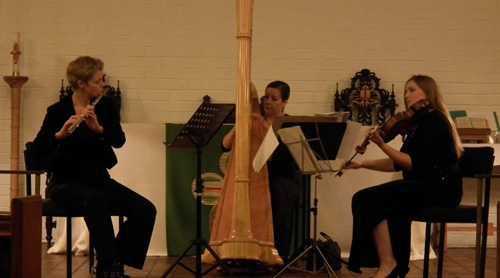
Echo Chamber Ensemble
On November 6th the Society welcomed the Echo Chamber Ensemble. This Trio of Ruth Morley, Flute; Hannah Craib, Viola and Sharron Griffiths, Harp played a selection of Duos and Trios. Ruth studied at the RSAMD and now teaches there. Hannah was born in Fife, studied at the Royal College of Music and played in the Alba String Quartet for four years. Sharron was born in Wales, attended the RNCM and now teaches at the Royal Conservatoire.
Their programme started with Arnold Bax's Elegiac Trio and continued with Vincent Persichetti's Serenade No 10 for Flute and Harp. The first half ended with William Mathias' Zodiac Trio. After the interval, the Trio played Ibert's Deux Interludes, then Hannah sat out for the Duo, Danse Lente Op 65 by Joseph Jongen. The concert ended with the Sonata for Flute, Viola and Harp by Debussy. The music may have been unfamiliar, but the sound was glorious and each item was introduced by a Trio member in a relaxed manner.
Douglas Paton
4th Dec 2013
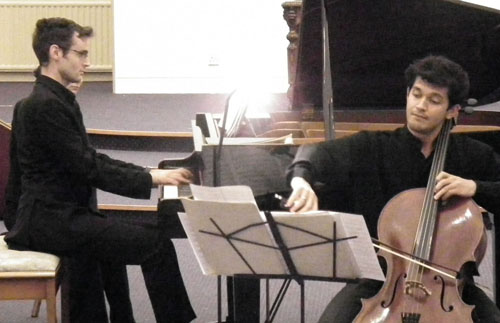
Ashok Klouda and John Reid
For its Concert on December 4th the Society had changed the venue to Kirkcaldy Old Kirk so that its Piano could be used for the Cello / Piano duo of Ashok Klouda and John Reid. However, our "best laid plans" went awry as John took ill in the afternoon and spent time in A & E at Victoria Hospital. This meant a change of programme before John made it back for the second half after some excellent medical care from the hospital staff.
Ashok Klouda has an impressive list of qualifications after his name and is a member of the Artea Quartet and the Callahan Piano Trio. John Reid is a Pianist of notable versatility with experience of Chamber Music, Song Accompaniment and Solo playing. Ashok told us his contract stipulated no change could be made to the programme! In view of his sterling efforts there will be no complaints from the society in this case!
For the first half he added Bach's Solo Cello Suite No 1 BWV1007 to the programme and played the six movements from memory. He returned to the programme for Britten's Solo Cello Suite No 2 Op 80. He explained the Fugue in the second movement and demonstrated its construction. After the interval Ashok and John played Three Pieces by Frank Bridge; Spring Song, Melodie and Scherzetto. More Bach followed with his Gamba Sonata BWV1028. This was written for Viola da Gamba and Harpsichord, but has been transcribed for Viola and Piano as well as Cello and Piano.
For an encore the Duo returned to the original programme and played the Adagio movement from Mendelssohn's Cello Sonata Op 58. The Duo's playing was outstanding, especially given the difficult circumstances.
Douglas Paton
22nd Jan 2014
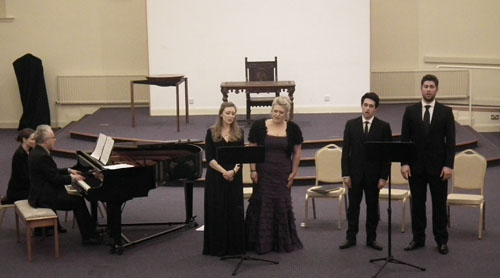
The Song Studio of the Royal Conservatoire
Last Wednesday the Recital in the Kirkcaldy Music Society's series was given by The Song Studio of the Royal Conservatoire 4 singers Louise Kemeny Soprano, Eirlys Davies Mezzo, Luperci de Souza tenor, and Dominic Barberi Bass with their Director Tim Dean accompanying them on the piano.
Their programme was described as "a whimsical narrative charting the unpredictable course of romantic relationships" And so it was as the singers most beautifully characterized the flirtatiousness, despair, delight, trauma and humour of a delightful choice of love songs which ranged through Schubert Schumann Brahms wolf Debussy and many more.
The beautiful voices filled the Old Kirk with wondrous sounds (particularly the repeated "Reviens" in Berlioz's "Absence" where we could hear the voice still echoing as she started the next phrase.) The variety of mood and music carried the programme along without interrupting applause as the singers drifted gently from one song to another. An absolute feast of singing with a magnificent accompanist who also introduced the evening in an amusing relaxed way. The large audience showed their great appreciation and when thanked Tim Dean said" Well it was such a lovely warm audience, delightful building to sing in so what's not to like"
Douglas Paton
19th Feb 2014
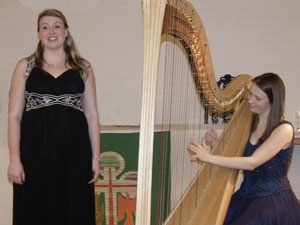
Elinor Nicholson and Juliet Montgomery
For its Concert on February 19th the Society welcomed the Harpist Elinor Nicholson accompanying the Soprano Juliet Montgomery. Both young ladies are currently in their fourth year at the Royal Northern College of Music. Juliet, who is from Stirling, began singing with the National Youth Choir of Scotland aged 16 and was invited to sing solo in her first year. Elinor started learning the Clarsach aged 10 and in 2012 won the Traves Trophy at the Edinburgh Competition Festival.
For our concert, Juliet sang sixteen songs, entirely from memory, ranging from John Dowland to Benjamin Britten. She included the well known Eriskay Love Lilt and Down by the Sally Gardens. Britten's 8 Folk Song Arrangements included David of the White Rock. Less well known was the wistful La Lettre du Jardinier by the French composer Marcel Tournier. She had started with Dowland's Weep ye no more, sad fountains, then sang two songs by Edmund Rubbra - The Hymn to the Virgin and Jesukin. The combination of the voice and harp made a wonderful sound.
The second half started with Michael Head's The Singer and after the Tournier song, Juliet finished with Deborah-Henson-Conant's The Nightingale. Earlier, Elinor had two solo pieces, Deux Impromptus by Jan Cras and Sally Beamish's Awuya. This music is inspired by a song sung to a girl called Awuya whose mother has sleeping sickness. The virtuoso piece begins with African drumming rhythms using the body of the harp.
All the items were introduced in a relaxed, friendly manner by both artistes. Earlier in the day the Society had organised for the girls to run two workshops for pupils at St Andrews High School, Kirkcaldy. The audience were delighted to hear these young ladies at the start of what is bound to be their illustrious musical careers.
Douglas Paton
19th Mar 2014
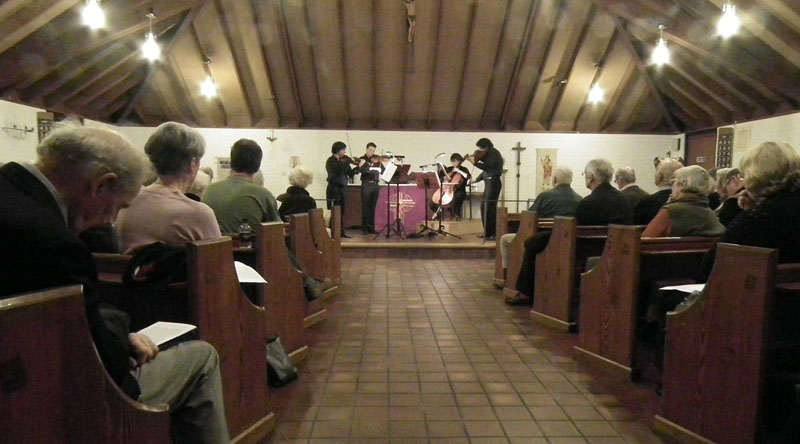
Fejes String Quartet
For its Concert on March 19th the Society welcomed the Fejes String Quartet. The Quartet, formed in 2006, is led by Tamas Fejes with Patrick Curlett, Violin, Mike Lloyd, Viola and Rachel Lee, Cello. They are all members of the Royal Scottish National Orchestra.
For our concert they played Haydn's Quartet Op 64 No 4, Verdi's Quartet in E minor and Mendelssohn's Quartet Op 80. Mike Lloyd introduced each piece enthusiastically, adding to the information in the programme notes. Haydn's six Op 64 Quartets are amongst his mature works. Verdi had written his only Chamber Music work when rehearsals for Aida were halted due to the illness of the prima donna, Teresa Stolz. With time on his hands he completed his Quartet in 1873 and it is a wonderful mixture of orchestral and singing elements.
After the interval we heard Mendelssohn's powerful and eloquent Op 80 Quartet. He wrote this after the death of his beloved sister, an event from which he never fully recovered. Less than six months later, on 4 November, Mendelssohn himself died, aged only 38. After this highly charged Quartet, prolonged applause brought an encore of the Scherzo from Mendelssohn's Op 81 Quartet Movements. This had been written earlier in 1847 and is typical of his scurrying Scherzos.
Douglas Paton
16th Apr 2014

AGM and Randall family & friends
On Wednesday April 16th, Kirkcaldy Music Society held its AGM Concert. The evening started with the Treasurer presenting the accounts which showed a small surplus of £113.93. The Chairman then reviewed the past season in which, for the first time, we had two concerts in the Old Kirk. The Secretary outlined the plans for next season, which will include three concerts in the Old Kirk.
A concert by the Randall family and friends followed. Daughter Chloe started with the two bourees from Bach's Cello Suite No 3. Then, accompanied by Graeme Wilson, she played Squire's Tarantella. The piece may be familiar, the composer less so. William Squire was a British cellist and composer. Her sister Rosie then played the beautiful slow movement from Saint-Saens' Oboe Sonata and Ravel's Habanera, again accompanied by Graeme. April Randalll on Viola, was joined by friends Eva Lundell, Violin and Stephen Morrison, Guitar to play Beethoven's Serenade Op 8. This piece, originally written for Violin, Viola and Cello, was arranged for the Guitar to take the Cello part by Matiegka. This little known piece deserves to be heard more often.
After warm applause, the Chairman thanked all the players for their wonderful performances. The audience and players then retired to enjoy some social chat accompanied with wine and delicious savouries. Later the raffle, with some wonderful prizes, was drawn, bringing the season to a happy end.
